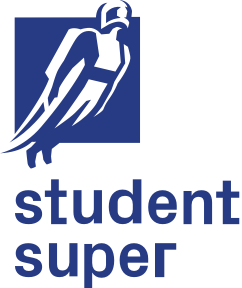The Ultimate School Leavers Guide:
Finished high school - what's next?
15 min read
How did you feel when you put down your pen at the end of your final exam? If you’re like most Year 12 students, you may have felt:

Anxiety about the questions you should have got right

Uncertainty about whether your marks will be good enough

Excitement that you’re done with school forever

Sadness that you’ll be leaving your school friends behind

Total confusion about what you’re going to do with your life next
And the fact is, most of us have no idea what we want to do when we finish high school. Despite speaking to a career advisor or attending a career expo and university open days, the majority of us only have this vague notion that if we don’t get into uni then we’ll have to get a job.
I mean, when you’re only eighteen, how can you be expected to know what you want to do for the rest of your life?
The answer is, you can’t and that’s why we’ve put together this ultimate guide for school leavers. It outlines your options from university and TAFE through to taking a gap year or joining the workforce and includes the positives and negatives of each potential path you might choose.
Hopefully, it will give you an idea or two about what you might like to do after year 12, and even shed some light on some different paths you may not have yet considered.

To study, take a gap year or begin a career?

Going to university
If your marks are good enough and you like the idea of further education to gain a degree or begin an academic career, then Australia has world-class universities in every state.
The institution you attend will depend on the courses available, the offers you receive and where you want to spend the next few years of your life.
The following is a brief summary of Australian universities state by state.

ACT
- Australian National University (ANU) – a leading university offering a broad range of disciplines across seven academic colleges.
- University of Canberra – ranked in the world’s top 100 young universities and consistently delivering 89% graduate employment.
Northern Territory
- Charles Darwin University – one of the most innovative teaching and research-intensive universities in Australia.
Queensland
- Bond University – awarded the most 5-star ratings in the 2019 Good Universities Guide.
- CQ University – a renowned research institution with a focus on a wide range of learning categories.
- Federation University of Australia – offers a wide range of nationally and internationally industry-relevant programs.
- Griffith University – ranked among the top 10 providers for Hospitality & Leisure Management and the top 50 for Nursing and Law.
- James Cook University – Australia’s leading university for research into the challenges facing the tropics worldwide.
- Queensland University of Technology – a major Australian university and one of our fastest growing research universities.
- University of Queensland – a leading research and teaching uni with more teaching awards than any other Australian university.
- University of Southern Queensland – a top uni for graduate employment offering over 100 on campus and online degrees.
- University of the Sunshine Coast – a leading uni offering over 100 undergraduate and postgraduate study programs.
Tasmania
- University of Tasmania – ranked in the top 2% of universities and among the world’s best for Earth and Marine Sciences.
Victoria
- Deakin University – offers a curriculum integrating real world expertise with practical skills in partnership with industry.
- Federation University of Australia – has campuses in Ballarat, Berwick, Gippsland, the Wimmera and Brisbane (see Queensland).
- La Trobe University – rated among the top 10 universities in Australia and the top 3 in Victoria.
- Monash University – Australia’s largest uni offering a wide choice of courses, study options and research projects.
- RMIT University – renowned for excellence in professional and vocational education, applied research and industry engagement.
- Swinburne University of Technology – boasts one of the top design schools in the world and offers a variety of other areas of study.
- University of Divinity – offers undergraduate and postgraduate diplomas and degrees comprising a range of study areas.
- University of Melbourne – has a curriculum designed to prepare students for today's competitive job market and workplace.
- Victoria University – ranked in the world’s top 2% and one of Australia’s largest and most culturally diverse universities.
NSW
- Australian Catholic University – ranked among the top 3% of universities worldwide and the top 10 Catholic universities.
- Charles Sturt University – Australia's leading regional uni providing higher education opportunities in a wide range of disciplines.
- Macquarie University – consistently ranked in the top 2% of universities in the world and the top 10 in Australia.
- Southern Cross University – one of the Asia Pacific’s top 100 universities and the world’s top 50 Gen Y universities.
- University of New England – Australia's most experienced distance and online education provider, offering more than 200 courses.
- University of New South Wales – one of Australia's leading research and teaching universities.
- University of Newcastle – a research-intensive uni ranked in the top 3% of universities worldwide and the top 8 in Australia for research.
- University of Sydney – ranked among the world’s top 50 universities and offering the widest range of courses in Australia.
- University of Technology Sydney – one of the largest universities in Australia, offering courses across a wide range of disciplines.
- Western Sydney University – ranked among the top 2% of universities worldwide and the top 100 young universities.
- University of Wollongong – a research-intensive university offering a broad range of disciplines.
South Australia
- Carnegie Mellon University – a prestigious US uni with a campus in Adelaide, ranked amongst the world’s top 50 universities.
- Flinders University – offers a wide range of programs, with 90% of its research rated world class or above.
- Torrens University Australia – offers courses in 5 fields of study including Business, Design, Health, Hospitality and Education.
- University College London – one of the world’s leading multi-disciplinary universities offering a wide range of programs.
- University of Adelaide – a highly respected research-intensive university ranked among the top 1% of universities worldwide.
- University of South Australia – SA’s largest university offering a range of undergraduate and postgraduate degree programs.
Western Australia
- Curtin University – has a strong international focus, with campuses in Perth, Singapore and Sarawak.
- Edith Cowan University – rated one of Australia’s top public universities for student experience and teaching quality.
- Murdoch University – ranked highest in Australia for graduate employment and world class or above for 85% of its research.
- University of Notre Dame Australia – has a curriculum designed to empower students with the fundamentals of critical thinking.
- University of Western Australia – ranked first in Western Australia and among the top 100 universities globally.
Studying online
Of course, if you’d prefer to go to uni on your own terms, you can opt to study online, which would let you study whenever and wherever you want. Most universities offer some or all of their courses online and the beauty of studying this way is that you can choose to study at the pace you need to fit in with your lifestyle.
While you may need to attend campus occasionally for exams or certain course requirements, most of the time all you need to study remotely is a reliable Internet connection and somewhere quiet where you can work uninterrupted.
Online study methods are highly sophisticated these days, providing tutorials via video link, access to teachers via email and chat sites and 24/7 access to all course materials online.


Working while you study?
Get your super sorted today.
Studying full or part time
As well as choosing where you study (on campus, online or both), you can choose when you study, opting for a full or part time schedule depending on the demands of your lifestyle.
You may have a job or a young family, so it’s important to work out how much time you’ll have available when deciding on full or part time study. Some courses will allow you to change to part time mid-course if you find you’re not keeping up, so if you have a lot of demands on your time, consider a flexible study regime that will help you achieve your goals at your own pace.
Of course, if you plan to apply for Austudy or Youth Allowance, you’ll need to be studying full time, which the government defines as at least 75% of your courses’ full time study load.
Key dates to keep in mind
While exact dates will vary from year to year and institution to institution, general dates to keep in mind if you’re planning to attend university include;
- Mid-September – early round offers from institutions that offer courses prior to Australian Tertiary Admission Rank (ATAR) results being released.
- December - release of ATAR results and first round offers made through the University Admissions Centre (UAC) based on your ATAR results.
- January – opportunity to change your preferences, release of second round offers and enrolment finalisation by most universities (census date).
- February – commencement of semester one.


What if I don’t get my dream uni offer?
If you don’t get the place you want in university, don’t have a meltdown because it’s not the end of the world. There’s more than one way to skin a cat (not that you’d want to unless you were enrolling in a taxidermy course), and there are several different paths you can take to reach the same destination.
You could enrol in single subjects (bridging units) which usually have fewer eligibility requirements and can count towards a diploma or degree. Or, you could undertake a course at another institution and then transfer to your preferred course at a later date. With this option, you could also study part time, online or as a mature age student with the ultimate goal of getting into your dream university course.
And you never know, not getting into your preferred course could turn out to be a blessing in disguise. Trying other alternatives could unearth areas of study that you may find you like more than your initial preference.
So remember that your ATAR score does not define you and don’t be afraid to try new things.
Alternatives to university
If university isn’t for you, there are other study pathways you can take to equip you with valuable skills and prepare you for a successful career. These include Vocational Education and Training (VET) programs, Technical and Further Education (TAFE) courses and career-specific courses offered by Registered Training Organisations (RTOs).

VET programs
There are thousands of courses available through the Vocational Education and Training (VET) sector which can qualify you for a variety of exciting careers.
VET courses offer Certificates, Diplomas and Advanced Diplomas, which are designed in consultation with relevant industry bodies and are recognised pathways into a range of careers.
They are offered through RTOs, TAFEs and some universities and as well as providing training for the workforce, they can often be used to provide credit towards higher education courses.

TAFE courses
Technical and Further Education (TAFE) institutes offer practical hands-on courses (including a wide range of VET courses) designed to prepare you for vocational careers such as hospitality, child care or design. And they use industry-standard equipment, meaning you graduate ready for employment.
Compared with the more theory-based courses typically offered by universities, TAFE courses have a practical focus, lower entry requirements, lower cost and a shorter completion time. It’s often believed that doing a TAFE course in a vocation you’re interested in can greatly improve your job prospects in that field.

Registered Training Organisations
There are Registered Training Organisations (RTOs) all over Australia (currently around 5,000) offering quality-assured and nationally recognised training and qualifications.
RTOs offer accredited VET qualifications, providing training in the specific skills you need to succeed in your chosen industry. They are required to adhere to standards and guidelines set by the Australian Skills Quality Authority (ASQA) to ensure that their courses are a high quality and relevant to future employers and the industries involved.

Apprenticeships
Another career pathway other than through university is an apprenticeship, which is a great way to learn your craft while getting paid at the same time.
Australian apprenticeships are provided through a cooperative arrangement between Federal and State governments, industry bodies, employers and RTOs and they offer a range of great benefits including;
- A head start in your chosen career
- Paid work and structured on-the-job training
- Reduced training time through recognition of existing skills and prior experience
- The option of full time, part time or school-based training
- Nationally recognised qualifications which can be used here or overseas
Thinking about the future?
Get your super sorted today.

Should I study at a TAFE or private college?
If you’re looking at doing vocationally-focused training to qualify for employment in a particular field, you might ask yourself whether you should enrol at your local TAFE or private college specialising in your chosen career path.
And the answer is they are both good options and the one you choose will depend on your own personal situation and preferences. For example;

A private college that specialises in your chosen field is likely to have the best resources and extensive industry links than an institution offering a wide range of different courses.

As private college courses tend to be more highly focused and industry-specific, they’re often shorter courses than their TAFE equivalents.

A private college is also likely to have a smaller more intimate campus, which can be less daunting for first time tertiary students and offer better teacher/student ratios and more personalised attention from staff.

On the other hand, while TAFE institutes get a large proportion of their funding from the government, private colleges rely on course fees for the majority of their funds, meaning you are likely to pay more for your course at a private college than you would through a TAFE.

Should I take a gap year?
Another possible option when you finish high school is to forget about university, TAFEs, RTOs and apprenticeships and instead take a year off to figure out what you want to do.
After finally making it through 13 years of school, you may find the thought of more study unappealing and a gap year can be a great chance to blow away the cobwebs and focus on something else other than textbooks for a change.
As well as the opportunity to make some money, which is a great motivation for many who take a gap year, it’s also a chance to get out there and see what life has to offer outside the classroom, particularly if you still have no idea what you want to do with the rest of your life.
A gap year can be put to a variety of uses including;

Volunteering – not only makes you feel good about giving back to the community, but it can also provide useful skills and experience for a career path you may be interested in pursuing (i.e. environment, archaeology, health care etc).

Paying for your education – if you don’t have the Bank of Mum & Dad to fall back on, taking a gap year can be a good chance to earn some money to fund your future studies.

Work experience – like volunteering, this can get you in on the ground floor of a career you might be interested in and even though it doesn’t pay well it can be an enriching experience.

Life experience – a gap year is a great chance to see the world before you bury yourself in the books again and a working holiday or student exchange is a great way to meet new people, experience other cultures and broaden your mental horizons.

Should I get a job?
Sometimes, not having had money for so long during your school years (other than pocket money if you were lucky) can make joining the workforce an attractive possibility. All the things money can buy can suddenly be attainable if you get a job after finishing high school.
Of course, it’s not likely to pay as well as the kind of job you could score with a university degree, but bringing home a paycheck each week can be an exciting prospect. And whether it’s full time, part time or while you are studying, a real world job has several benefits aside from the money;
- It teaches you about managing money – having to focus on earnings, paying bills and saving are all things we have to do in life, even as university students. So it’s a good idea to begin getting a handle on money early. Getting a head-start on long-term financial planning and things like superannuation can make life easier in the future and make a big difference when it’s time to retire, so get started putting your money to work for you.
- It can get you a foot in the door – if it’s a job in the industry you are interested in joining, an entry level job can help you get in on the ground floor. Many famous entrepreneurs started at the bottom and worked their way up and it’s still possible to do this if you don’t mind a bit of hard work.
- It can help you find out what you want to do in life – sometimes realising what you don’t want to do (i.e. flipping burgers at a fast food outlet) can help you discover what you do want to do and getting an entry level job can be a means to an end in this regard.
Join thousands of young Australians getting their super organised today

So where to now?
If after reading this guide, you still find yourself wondering what you’re going to do with your life, the good news is that any decision you make now can always be reversed at a later date.
So if you find yourself at uni studying the wrong thing or working in a job that you hate, bear in mind that you have your whole life ahead of you and making a wrong choice can be easily rectified by making a right one!
And if you want to explore your options further, here are some useful sources for;
Going to Uni – The Good Universities Guide
Getting your super sorted – Student Super
Taking a gap year – Year 13
Going to TAFE – tafe courses.com.au
Getting a job – Get Job Ready Guide
Good luck and see you out there … wherever that may be!


Join other Australian students that are saving with zero admin fees for balances under $1,000.
See our Fees & discounts page or PDS for details



